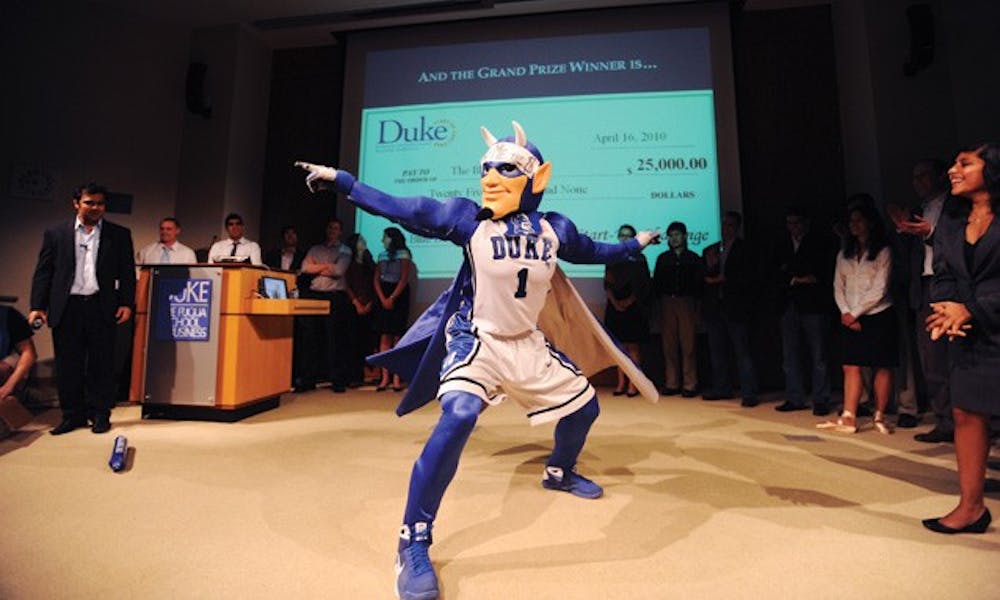Dan Certner, Trevor Ragan and Shaan Puri, members of the recently-graduated Class of 2010, appeared like typical college graduates. Their career paths were standard for Duke grads: Dan was ready for Wall Street, Trevor wanted to be a high school teacher and Shaan was heading to medical school.
Then, all three put their plans on hold.
Their new idea is to become entrepreneurs—more specifically restaurateurs.
The spotlight has been shining on the trio’s decision since April 16, the day they became the first undergraduate team to win the Duke Start-Up Challenge with their idea for Wasabi–newly minted Sabi Sushi–a fast and customizable sushi restaurant. Think the Subway of sushi.
Dan, Trevor and Shaan aren’t the only ones who have caught the entrepreneurial fever. The Start-Up Challenge, an annual student-led competition in which teams of undergraduate and graduate students compete for $25,000 to fund a business idea, just finished its 10th year with a record number of competitors. This year, the challenge had 109 teams—70 more than last year’s total. In addition, there were also a record number of 41 undergraduate teams and 21 women-led teams.
Jon Fjeld, the director of Duke’s Center for Entrepreneurship and Innovation, gives two reasons for the increased popularity of the challenge and entrepreneurship in general. The first one is no surprise—the state of the economy and the weak job market. Student interest in the five year-old center is much greater than when it opened before the credit crises.
“Entrepreneurship creates a positive energy in the economy,” Fjeld said. “It’s people trying to do something new and get something going… that’s where the action is going in the economy.
Fjeld also said people are starting to notice the interdisciplinary nature of starting new ventures and realizing the value of the experience. Part of this enlightenment could be a result of the Center’s push to get more undergraduates to take advantage of its services.
Howie Rhee, the managing director of the Center for Entrepreneurship and Innovation, said that students have always been enthusiastic about entrepreneurship. It was just a matter of reaching out to students—especially undergraduates—and offering enough resources and help so they are not afraid to take the first step behind a possible business idea.
“Before, if students wanted to be entrepreneurial, they had to find their own path. It wasn’t just about how good your idea was, but if you could do it as a student,” Rhee says.
“What we’re doing now is… providing those clearer steps of how to get started and making it easier to get on the path of being an entrepreneur.”
The resources at Duke are numerous. DUhatch, the appropriately named “incubator” of entrepreneurship, offers office space for entrepreneurial teams working on start-ups and guidance from local business consultants. The Duke Global Entrepreneurial Network connects current students to alumni who are willing to help with new ventures, whether it’s offering legal advice or investment money.
And finally, there’s the Program for Entrepreneurs. The two year-old program matches students interested in entrepreneurship to form teams that will work together on a start-up idea. Those enrolled in the program will be guided and mentored by business professors and receive course credit. One of the teams advised by the program, EntoGenetics, won the Start-Up Challenge in 2009.
In addition to all these resources, young Dukies have even more to be excited about as business leaders turn their eyes toward the University’s promising entrepreneurs.
Duke alumnus Aaron Patzer, ’02, founder of the personal finance website Mint.com—which recently sold for $170 million—was a keynote speaker at this year’s Start-Up Challenge. In an homage to the entrepreneurial spirit, Patzer made an impromptu announcement that he would be investing $250,000 over the next five years in Duke start-ups because he was so impressed with the ideas he saw in the competition.
Both Patzer and Bill Maris, co-founder of GoogleVentures and a judge at last December’s Elevator Pitch Competition, have described the start-ups and ventures at Duke to be as exciting, if not more, as those in Silicon Valley.
But before students start seeing dollar signs, they should also be prepared to live the life of a budding entrepreneur – which isn’t all fine wine and extravagance.
Dan, Trevor and Shaan are in the process of moving Sabi Sushi operations to Boulder, Colo. The three will relocate there this month to live in Trevor’s aunt’s basement.
“You can’t be an entrepreneur without living in a basement,” Dan says matter-of-factly.
Get The Chronicle straight to your inbox
Signup for our weekly newsletter. Cancel at any time.

